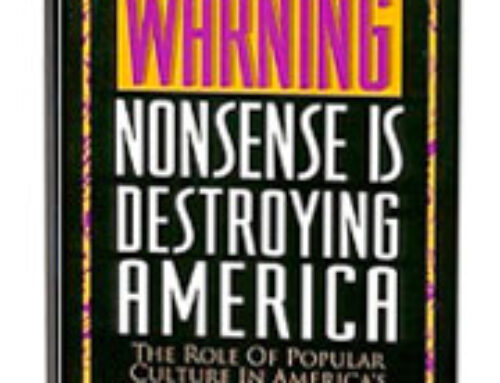 What mental error poses the greatest obstacle to intelligent thought and behavior today? It’s hard to pick just one, but if pressed, I’d say “mine is better” thinking. The term can’t be found in most logic books—I coined it many years ago in a book on thinking to describe a mindset that was becoming increasingly evident in all walks of life.
What mental error poses the greatest obstacle to intelligent thought and behavior today? It’s hard to pick just one, but if pressed, I’d say “mine is better” thinking. The term can’t be found in most logic books—I coined it many years ago in a book on thinking to describe a mindset that was becoming increasingly evident in all walks of life.
Today, evidence of “mine is better” thinking is everywhere, including education, journalism, law, and perhaps most notably, government. Before turning to examples, let’s clarify what it is and how it has become so prevalent.
“Mine is better” thinking begins in childhood. Children say, “my teddy bear is cuddlier than yours,” “my dolly is nicer,” “my tricycle is faster.” Soon they are also saying, “my mommy is prettier,” “my dad is stronger,” and “my dog is smarter.” Though offered as facts, such statements are simply expressions of ego that say, “I am special, so everything associated with me is too.”
As children grow older, they are inclined to think the same way about their beliefs and opinions: “If I believe something to be true, it must be true, so I don’t need to examine the matter further or consider the evidence for and against it.”
Note that I said only that they are “inclined” to think that way, and inclinations can be overcome. Parents and teachers can help children understand that it is natural to love our family and friends and to prefer familiar ideas, but that fact doesn’t necessarily elevate them to a higher status. They can also help children realize that other people feel the same way about their friends and ideas.
Most important, parents and teachers can help children understand that in matters of judgment (as opposed to matters of taste, such as music and clothing style), familiarity and preference do not matter—only evidence does. And when the evidence does not support our view, maturity and honesty demand that we abandon it.
The problem is, for roughly the last half-century, all those lessons about “mine is better” thinking have been neglected. Carl Rogers, Abraham Maslow, and their disciples have persuaded parents and teachers that whatever a person wishes to believe is therefore true and that criticizing or challenging someone else’s “truth” damages the person’s self-esteem.
As I demonstrate in Corrupted Culture, not only were Rogers and Maslow mistaken about the concept of truth and the value of self-esteem; they also foolishly believed that creating our own truth and feeling wonderful about ourselves would make us more respectful and tolerant of others.
Embracing those notions has produced the opposite results. As more and more people have come to regard their “mine is better” thinking not as a bad mental habit but as reality, intellectual humility and the process of weighing evidence and searching for insights have been abandoned. Why search for something we believe we already possess?
The result has been hordes of people who are convinced not only that their opinions are “true for them,” but also true for everyone else. Also, that respect and tolerance should be accorded only to those who share their perspective—others should, if necessary, be coerced into accepting it.
Now for some examples of the unfortunate consequences “mine is better” thinking has produced:
In education: Neglecting traditional subject matter—reading, writing, grammar, and history—and focusing instead on matters of political correctness and on making students feel good about themselves. Also, using the classroom to promote teachers’ personal views, often in matters unrelated to their subjects, rather than to help students develop intellectual skills.
In journalism: Ignoring the traditional separation of fact and opinion in news accounts and presenting personal opinions as facts. Forming editorial positions on the basis of personal agendas rather than evidence. Omitting relevant information from stories or columns because it is unfavorable to the writer’s personal view.
In law: Legislating from the bench—that is, rendering court decisions on the basis of the jurist’s personal opinion rather than the facts of the case, the requirements of the law, or legal precedents. In the higher courts, viewing the Constitution as a “living document” that jurists can re-fashion to make it reflect their personal views.
In government: Passing laws and instituting regulations that go beyond what might reasonably be called guarding public safety, laws that force people to live as the lawmakers want them to live. Any number of examples are available in the news—from restricting salt and the size of soda drinks in restaurants to forbidding the sale of homemade cookies and lemonade, requiring vaccinations against parents’ wishes, and regulating what mothers put in children’s school lunches.
A more radical governmental action that reflects “mine is better” thinking is using tax dollars to “bail out” companies and even cities on the basis of elected officials’ judgment of their worthiness. Another is spying on American citizens in violation of the Constitution merely because some officials assume they are entitled to do so. A third is the Affordable Health Care law that enables bureaucrats to decide for hundreds of millions of Americans what their health care coverage will be, what doctors and hospitals they will be able to visit, and what services they will be reimbursed for.
In every one of these examples, people in positions of influence and power have thrown aside restraint, ignored the insights of their predecessors, and followed the promptings of “mine is better” thinking. This despite the distinct possibility—and in some cases, the incontrovertible evidence—that their thinking is certifiably wrong!
It is amazing how quickly we’ve gotten from the false egalitarianism of relativism—each to his own opinion and no opinion better than another—to the fascistic notion of our leaders that their opinions are best and we must embrace them.
It is also imperative to figure out how to get back to a saner perspective. Until we do, intellectual humility, the search for truth, respectful dialogue, and responsible decision making are certain to retreat even further into the mists of memory.
Copyright © 2014 by Vincent Ryan Ruggiero. All rights reserved

